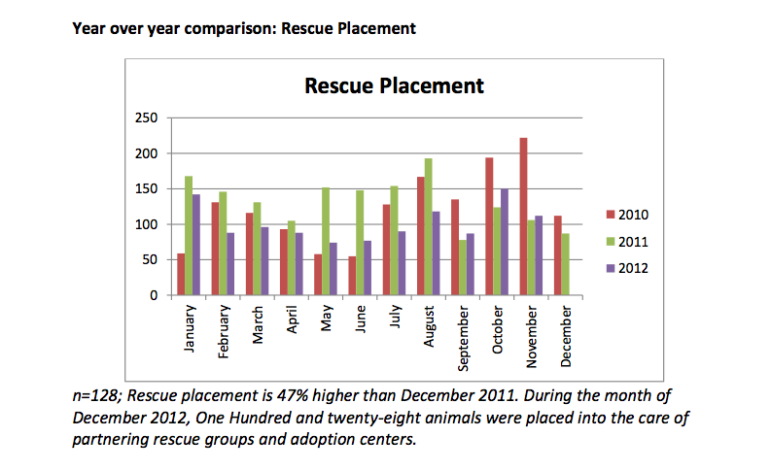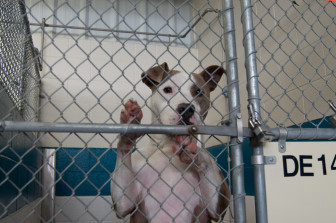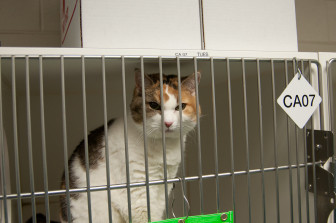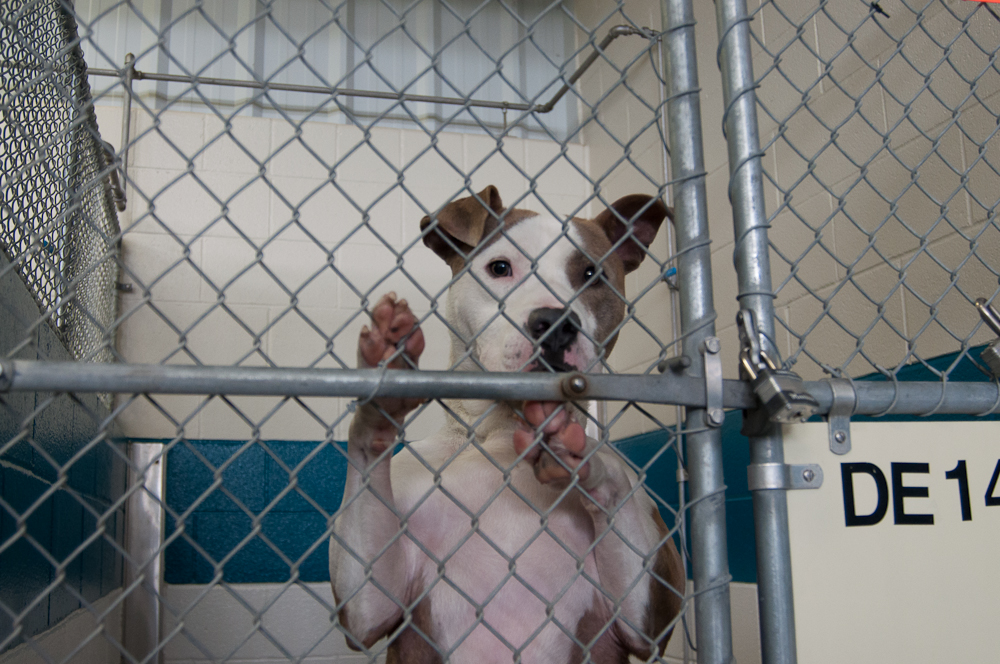Editor’s Note: This is part two of a two-part story.
Despite the recent complaints from Heidi Miller at HEART, a dog rescue group, Wake County Animal Shelter Director Jennifer Frederico said she aims to work more with rescue partners in an effort to decrease euthanasia rates.
She’s begun working with animal shelters and rescues in other states, especially in the northeast, where strict spay-neuter policies keep populations low.
“The more we can transfer out, the less we’re euthanizing,” she said.
Despite that sentiment, other shelter groups echo Miller’s concerns.
In 2009, Sound Pet Animal Rescue rescued more dogs from the Wake County shelter than any other rescue group — 113 or 114, according to Peyton Gaudiosi, the group’s development director.
Of those, 82 percent were injured, ill or ugly, the rescue group’s specialty.
“Then there was a change in the shelter. Now we, like last year, we were only able to pull 40 from Wake county,” she said. “Out of that only three were injured, ill or ugly.”
Shelter Rooms
The Wake County Animal shelter is 24,653 square feet.
Dogs
Two rooms of 52 kennels
One room of 26 kennels
One room of 25 kennels
Two rooms containing 12 kennels each
A quarantine room with 30 kennels for sick animals
Another non-public room of 52 kennels
One medical room of nine kennels
Cats
Two rooms with 18 kennels each
Two rooms with 30 kennels each
One room of 18 kennels for those with upper respiratory infections.
One quarantine room with 16 kennels
One room for feral cats
Gaudiosi said one could theorize that “all of the sudden there are just no more hit by car dogs” or those breaking legs or those that are ugly and unwanted. But in truth, it seems those dogs are likely still showing up at the shelter, along with dogs accused of biting, she said.
“We never see them anymore,” she said. “Or if we do see them and we try to take it, they say no.”
Gaudiosi said Sound Pet carries more than $1 million in insurance to cover any possible scenario. Her foster homes want to take the injured, the sick and the unwanted dogs, rehabilitate them and find them good homes.
“Before 2010, every week we were getting emails of this dog … and we’d rush down there and pick him up. We would be right there,” she said. “I don’t know what is going on, but we never get those.”
Gaudiosi said earlier this year, area rescue groups received an email from the shelter asking for dogs to be picked up so they could avoid euthanizing to make room.
“We went out there, the shelter was half empty,” she said. “If you’re full, the shelter should have 10 cages maybe available.”
Changes at the shelter the past year have led her foster families to avoid it. Now, they drive to Cumberland County and Chatham County to rescue animals.

As of April 2013, they had not rescued one dog from Wake County. However, in May Guadiosi said she received a few phone calls to pick up dogs.
Gaudiosi said it boils down to a communication and cooperation. Sound Pet wants to help dogs, but shelter employees were often telling them no. It’s like a slap in the face, Gaudiosi said.
“It used to just be a partnership, but it’s not,” she said. “Our foster homes have been dismissed and spoken down to and they don’t want to go there anymore. When you walk into [Chatham or Cumberland County shelters] they’re so happy to see you. Where there are times you walk into Wake County and you feel like you’re irritating them.”
Gaudiosi said she doesn’t want to criticize some of the wonderful people who work hard at the shelter.
“I don’t want to seem like we’re bitter,” she said. “I know it’s a very difficult job. But I think the new leadership is struggling.”
Guadiosi told the Record in April she felt a lack of communication. Under prior leadership, rescue groups met yearly with shelter staff.
“Because of that, it all just worked. We wanted a dog, we got a dog. We fixed a dog and adopted it out,” she said. “Now we want a dog, they tell us no. We ask why, they tell us ‘we can’t tell you.’ And somebody walks out of the shelter mad.”

Jennifer Wig / Raleigh Public Record
“It almost feels like they would rather just euthanize and move on,” she said.
Change is Coming
From creating a cat colony outside to buying a dental machine, change is coming, Frederico said.
“That’s huge; you have no idea,” she said, adding that small dogs often have terrible teeth problems. “And we would make them ‘rescue only’ because we can’t screen people to say ‘are you going to leave here and get $700 worth of dental cleaning done and teeth pulled?’”
Not all the changes are animal related. The shelter now has an accountant assigned to help look for ways to lower costs, too.
For example, the shelter purchases thousands of leashes each year for people to use when they take a dog home. The leashes used to have stitching on them reading “Wake County Animal Shelter.”
Leashes with stitching cost double the price, and most people threw them away, Frederico said, so new leashes don’t have stitching.
“We’ve had positive change,” Frederico said. “It was exciting to take a division that was up in arms.”
Still, more changes will occur after the consultant delivers her report. Frederico expects that final report to be more than 100 pages long.
“It’s going to give us a lot of information not only on what has gone on in the past, but we can do in the future.”
“At the end of the day as long as we’re benefiting the animals and getting them out, that’s what our goal is.”
That’s exactly what Miller, with HEART, wants to hear, but she’s skeptical. But she said many things have improved since the start of the year.
“They really are doing a lot more since January trying to get the word out to rescue, getting volunteers involved and getting dogs out either to rescue or adoption,” Miller said. “So 80 percent of what they’ve got going, that I can see, is working well.”
Miller said one shelter employee in particular has made efforts to make sure dogs have a chance at rescue before euthanasia.

Jennifer Wig / Raleigh Public Record
“There are just a few more areas where they could improve the outcome for dogs that enter their facility,” Miller said.
She said the shelter invited rescue partners to visit the facility at the start of June, which might be a positive sign.
Guadiosi remains skeptical. She said while she’s heard Miller has experienced improvements, she has not. Although they have received a few calls since May for dogs, it has not been easy to get them and some shelter employees display disdain for animals in general or certain breeds.
“I truly think some of the employees care and really care, but some just want the animals out, either through the front door or back,” Guadiosi told the Record in an email. “It really doesn’t matter to them.”
In some cases, Miller agrees. She recently picked up a Chihuahua that was described as “a mean, nasty, vicious dog.” That dog turned out to be just fine, Miller said.
“I think it’s great if they make some changes,” she said. “If we’re acknowledging that rehab is possible and at least worth a try, that we can work with those rescue groups that are willing and able to rehab … So yes, I’d love to see changes. I just have no way of knowing whether those are going to be positive change or changes that are going to set them back another 20 years.”
